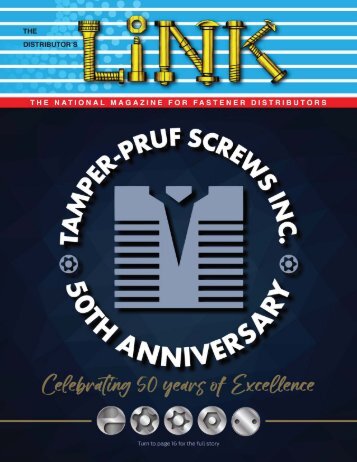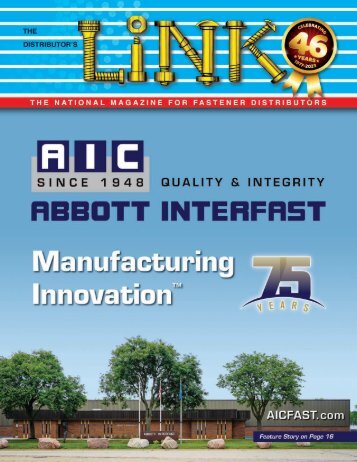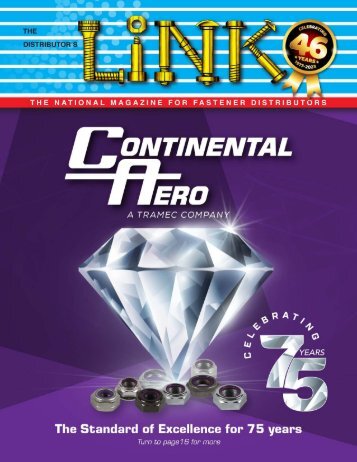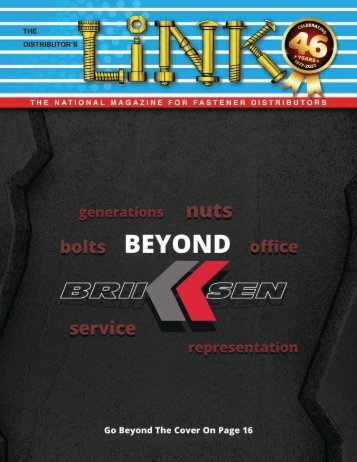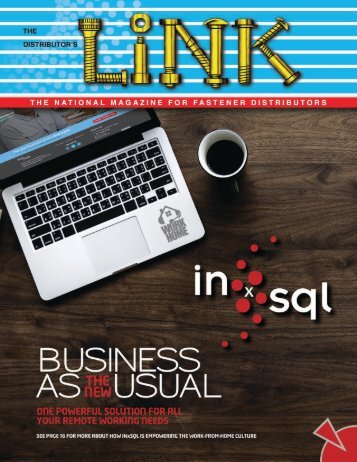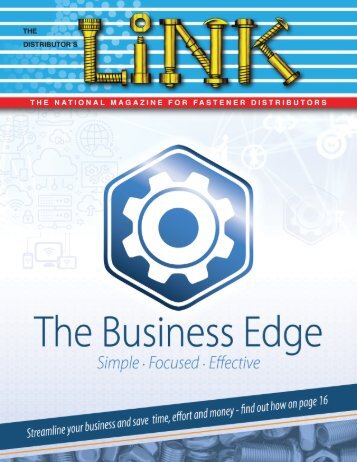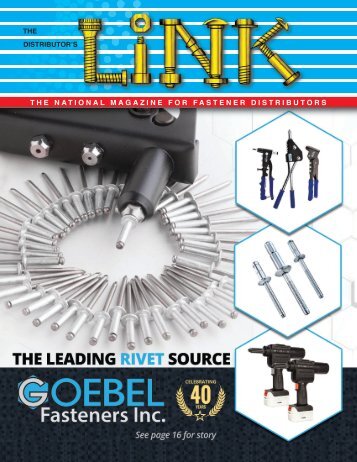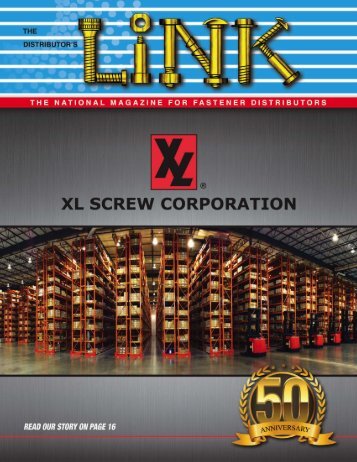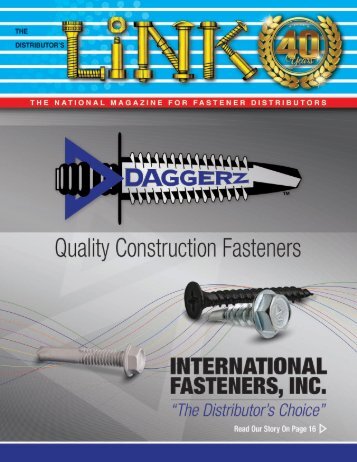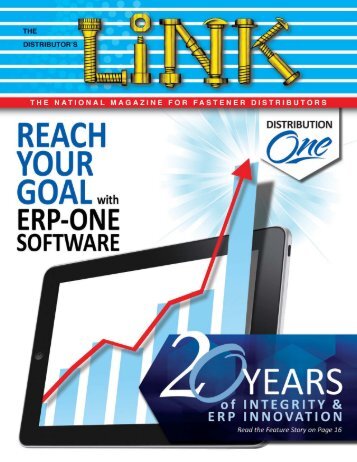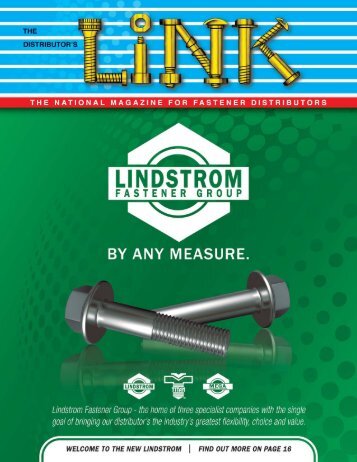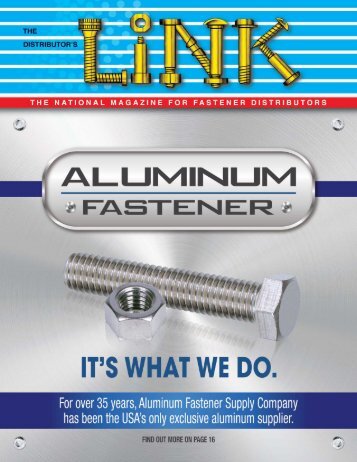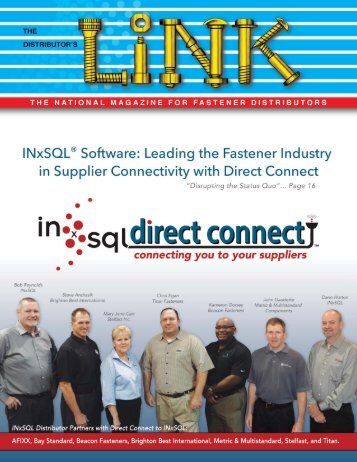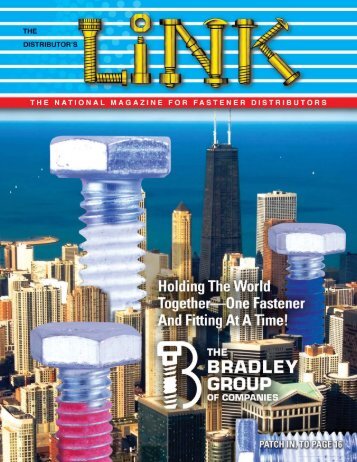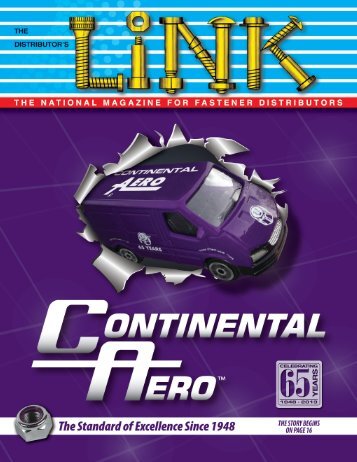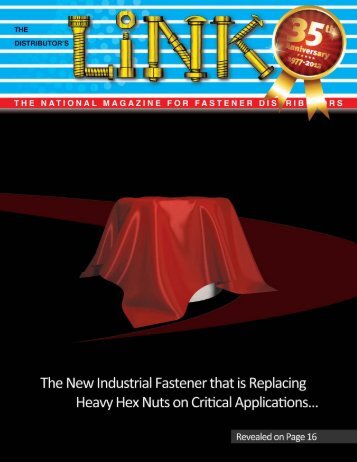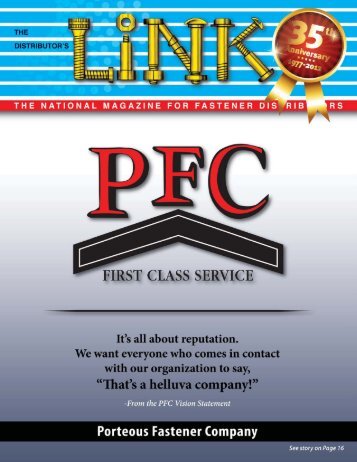FALL 2016
- Text
- Fastener
- Fasteners
- Products
- Manufacturing
- Industrial
- Screws
- Components
- Bolt
- Distributor
- Distributors
58 THE DISTRIBUTOR’S
58 THE DISTRIBUTOR’S LINK Bart Basi Dr. Bart A. Basi is an expert on closely-held enterprises. He is an attorney, a Certified Public Accountant, and President of The Center for Financial, Legal & Tax Planning, Inc. He is a member of the American Bar Association’s Tax Committee on Closely-Held Businesses. AVOIDING AN INEVITABLE FAMILY FEUD Introduction If you are a parent, do you remember watching your children squabble over who should get to watch their show on TV, or whose toy it was, or even who got to ride in the front seat of the car on a trip to the grocery store? Have you ever seen your children or nieces or nephews destroy something in the process of fighting over it? If you are a parent, aunt or uncle of course you do! That what kids do…fight like crazy over absolutely every matter imaginable. Now imagine them fighting over a potentially million dollar asset. Kind of terrifying. If you own a family or closelyheld business, this kind of battle could be in their future. There are thousands of family businesses in this country and each and every one of them can cause an incurable rift within the family when passed on. If you have a family business, quite simply, you need a business succession plan in order to avoid a family feud. Background There are different types of exit strategies to choose from. Most entrepreneurs who start businesses set their ultimate goal as selling an initial public offering on NASDAQ. While this is a respectable and admirable goal, for most it is not likely to happen. Most exits from CONTRIBUTOR ARTICLE business involve a sale or some other succession from of the business. It is important to make a reasonable goal when creating an exit plan. This does not mean an IPO is unreasonable for everyone, but the business owner should think about possible alternatives to their primary goal or their intended exit. The alternatives include: [1] Sale of a Business A business is sold to an individual, group of individuals, or an entity. Doing this, the business owner receives cash or an equivalent for the business. However, it can be difficult to find a ready, willing, and able buyer to purchase the business. [2] Acquisition Similar to the “Sale of a Business” exit, but usually involves an outright purchase by another company. You receive cash right away, but you must find a ready, willing, and able buyer that wants to acquire your business and add to their business. [3] Merger In this type of exit, the business joins with an existing company. As with a sale of a business, you get cash, stock, or a cash equivalent, but you join in with new partners and may suffer a partial or complete loss of control of your business. In addition, you may end up with stock in another company. A Buy-Sell Agreement is used for the future exit strategy. CONTINUED ON PAGE 162
THE DISTRIBUTOR’S LINK 59
- Page 6 and 7:
6 DISTRIBUTOR NEWS 8 SHARING TECHNI
- Page 8: 6 THE DISTRIBUTOR’S LINK Fascomp,
- Page 12: 10 THE DISTRIBUTOR’S LINK NATIONA
- Page 16: 14 THE DISTRIBUTOR’S LINK Guy Ave
- Page 28: 26 THE DISTRIBUTOR’S LINK Carmen
- Page 32: 30 THE DISTRIBUTOR’S LINK Lorri H
- Page 36 and 37: 34 THE DISTRIBUTOR’S LINK Robert
- Page 38: 36 THE DISTRIBUTOR’S LINK Richard
- Page 41 and 42: BUSINESS FOCUS ARTICLE WYANDOTTE IN
- Page 44: 42 THE DISTRIBUTOR’S LINK COPPER
- Page 48: 46 THE DISTRIBUTOR’S LINK ALL INT
- Page 52 and 53: 50 THE DISTRIBUTOR’S LINK RAMCO S
- Page 54: 52 THE DISTRIBUTOR’S LINK COMPUTE
- Page 58: 56 THE DISTRIBUTOR’S LINK ADVANCE
- Page 66: 64 THE DISTRIBUTOR’S LINK INDUSTR
- Page 69 and 70: SEMS AND SPECIALS INC THE DISTRIBUT
- Page 72 and 73: 70 THE DISTRIBUTOR’S LINK MID-WES
- Page 74 and 75: 72 THE DISTRIBUTOR’S LINK Anthony
- Page 76: 74 THE DISTRIBUTOR’S LINK Brighto
- Page 79 and 80: THE DISTRIBUTOR’S LINK 77
- Page 81 and 82: THE DISTRIBUTOR’S LINK 79
- Page 84 and 85: 82 THE DISTRIBUTOR’S LINK RC FAST
- Page 86: 84 THE DISTRIBUTOR’S LINK Industr
- Page 89 and 90: WALKER BOLT THE DISTRIBUTOR’S LIN
- Page 92 and 93: MWFA 35th ANNUAL FASTENER SHOW ELK
- Page 94: 92 THE DISTRIBUTOR’S LINK BEACON
- Page 98: 96 THE DISTRIBUTOR’S LINK FIVE-M
- Page 101 and 102: THE DISTRIBUTOR’S LINK 99
- Page 104: 102 THE DISTRIBUTOR’S LINK Larry
- Page 107 and 108: THE DISTRIBUTOR’S LINK 105
- Page 110 and 111:
108 THE DISTRIBUTOR’S LINK Southw
- Page 114:
112 THE DISTRIBUTOR’S LINK SOUTHW
- Page 118:
116 THE DISTRIBUTOR’S LINK ZaGO M
- Page 121 and 122:
THE DISTRIBUTOR’S LINK 119
- Page 124 and 125:
122 THE DISTRIBUTOR’S LINK BENGT
- Page 126 and 127:
124 THE DISTRIBUTOR’S LINK NIFMSE
- Page 128:
126 THE DISTRIBUTOR’S LINK JOE DY
- Page 132 and 133:
130 THE DISTRIBUTOR’S LINK LAUREN
- Page 136 and 137:
134 THE DISTRIBUTOR’S LINK AEH (A
- Page 138:
136 THE DISTRIBUTOR’S LINK CARMEN
- Page 141 and 142:
THE DISTRIBUTOR’S LINK 139 GF&D S
- Page 144 and 145:
142 THE DISTRIBUTOR’S LINK PACIFI
- Page 146 and 147:
144 THE DISTRIBUTOR’S LINK ROBERT
- Page 148:
146 THE DISTRIBUTOR’S LINK LARRY
- Page 151 and 152:
THE DISTRIBUTOR’S LINK 149
- Page 154 and 155:
152 THE DISTRIBUTOR’S LINK MID-WE
- Page 156:
154 THE DISTRIBUTOR’S LINK ALL IN
- Page 159 and 160:
THE DISTRIBUTOR’S LINK 157 METROP
- Page 162:
MWFA 64th ANNUAL GOLF OUTING SCHAUM
- Page 165 and 166:
THE DISTRIBUTOR’S LINK 163 Smalle
- Page 167 and 168:
THE DISTRIBUTOR’S LINK 165 CROSSW
- Page 170 and 171:
168 THE DISTRIBUTOR’S LINK SPIROL
- Page 172:
170 THE DISTRIBUTOR’S LINK INDUST
- Page 183 and 184:
THE DISTRIBUTOR’S LINK 181
- Page 185 and 186:
THE DISTRIBUTOR’S LINK 183 J.W. W
- Page 187 and 188:
THE DISTRIBUTOR’S LINK 185 LAUREN
- Page 190 and 191:
188 THE DISTRIBUTOR’S LINK LORRI
- Page 192 and 193:
190 THE DISTRIBUTOR’S LINK ROBERT
- Page 194:
192 THE DISTRIBUTOR’S LINK RICHAR
- Page 197 and 198:
THE DISTRIBUTOR’S LINK 195 PACIFI
- Page 199 and 200:
NFDA 2016 ANNUAL MEETING & ESPS SES
- Page 202 and 203:
200 THE DISTRIBUTOR’S LINK CARMEN
- Page 204 and 205:
202 THE DISTRIBUTOR’S LINK LORRI
- Page 206:
204 THE DISTRIBUTOR’S LINK RICHAR
- Page 210 and 211:
208 THE DISTRIBUTOR’S LINK RC FAS
- Page 212 and 213:
210 THE DISTRIBUTOR’S LINK CARMEN
- Page 214 and 215:
212 THE DISTRIBUTOR’S LINK RICHAR
- Page 216:
MWFA 35th ANNUAL FASTENER SHOW ELK
- Page 220:
218 THE DISTRIBUTOR’S LINK RICHAR
- Page 223 and 224:
THE DISTRIBUTOR’S LINK 221
- Page 225 and 226:
THE DISTRIBUTOR’S LINK 223 Full L
- Page 228:
226 THE DISTRIBUTOR’S LINK C cont
- Page 232:
230 THE DISTRIBUTOR’S LINK M cont
Inappropriate
Loading...
Mail this publication
Loading...
Embed
Loading...
|
SHARE A PAGE FROM THIS MAGAZINE OPTION 1: Click on the share tab above, or OPTION 2: Click on the icon (far right of toolbar) and then click on the icon (far right of toolbar) and then click on the  icon (top right of the page). icon (top right of the page).
|
View Archives
Copyright © Distributor's Link, Inc. All Rights Reserved | Privacy Policy







